News
MILPITAS, CA -- Solectron Corp. today named former Maxtor executive Paul J. Tufano as chief financial officer.
Tufano was named president and CEO of Maxtor in 2003. Before that he was the company's CFO from 1996 to 2003, and chief operating officer from 2001 to 2003. He spent 17 years at IBM in various financial and general management roles.
Tufano replaces interim CFO Warren Ligan.
Tufano was named president and CEO of Maxtor in 2003. Before that he was the company's CFO from 1996 to 2003, and chief operating officer from 2001 to 2003. He spent 17 years at IBM in various financial and general management roles.
Tufano replaces interim CFO Warren Ligan.
NEWARK, NY -- IEC Electronics, an EMS firm traded over the counter, reported a first-quarter net loss of $48,000 on revenue of $3.6 million.
For the quarter ended Dec. 30, earnings were down 158% from a year ago, and sales fell 42%. The company cited last minute customer changes and technical isues for the downturn.
For the quarter ended Dec. 30, earnings were down 158% from a year ago, and sales fell 42%. The company cited last minute customer changes and technical isues for the downturn.
NEW YORK -- Huntsman Corp., a major supplier of soldermasks and conformal coatings for electronics, is rumored to be the object of a buyout.
The Wall Street Journal today reported that the chemicals company, whose 2005 sales were nearly $11.5 billion, was in serious discussions to be bought out for more than $4.3 billion.
The Wall Street Journal today reported that the chemicals company, whose 2005 sales were nearly $11.5 billion, was in serious discussions to be bought out for more than $4.3 billion.
Press Releases
- Altus Partners with Sellectronics to Enhance Manufacturing Capabilities with PVA Delta 8 System
- ITW EAE Celebrates Major Milestone in Domestic Manufacturing Expansion
- Micro Technology Services Selects PBT Works CompaCLEAN III for Advanced PCB Cleaning Performance
- Indium Corp. is Electrifying the Future with Advanced Materials Solutions at Productronica


